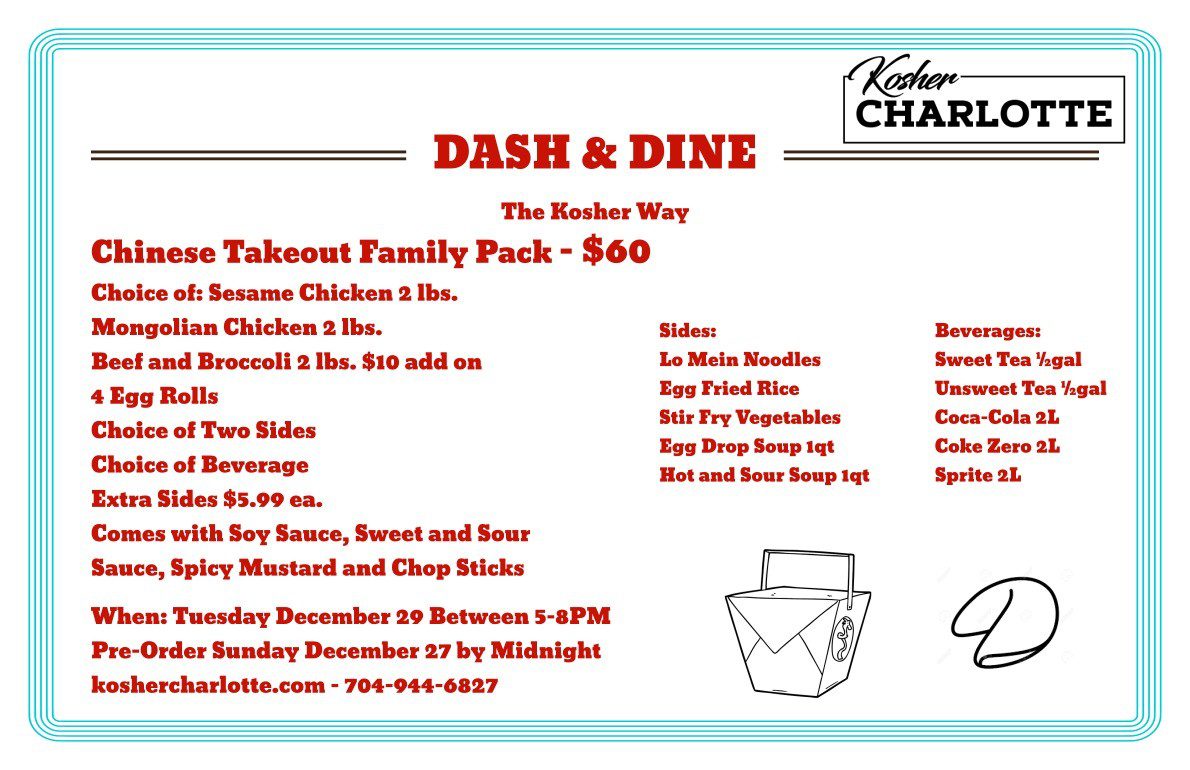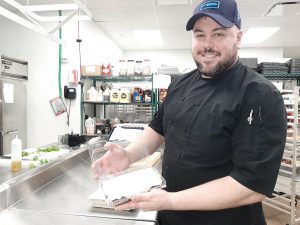With a bit of planning, organization, and a Yiddishe-kop, kashrut is within reach – even in the Old North State.
Marie Kondo has nothing over on Rochelle Wilensky when it comes to organizing a kosher kitchen.
Wilensky, a Charlotte, N.C. mother of two and religious school director at the Gastonia shul, Temple Emanuel, has made a study of knowing which nearby markets carry foods compliant with kashrut dietary laws, committing to memory where she can find products as varied as kosher ketchup and favored sweets, markets with the largest Pareve holdings, the best kosher meat, poultry, cheese, and dairy items.
“I keep a running grocery list on seven separate index cards, each labeled with a market that carries specific items,” says Wilensky, a self-described “Conservadox” Jew, placing her religious beliefs and practices in between the Conservative and Modern Orthodox branches of American Jewry. “Whenever I’m out running errands and close to one of these markets, I have the list handy to pick up whatever we may need.”
Before moving to Charlotte from Washington D.C. about 4 years ago with her husband, Moshe, Wilensky was able to determine, with a bit of planning, she could meet the dietary observances of her family and feel good about options and choices available for kosher dining in the Queen City.

“Some underestimate the demand [for kosher foods] here,” says Wilensky, who noted she and other friends often bring kosher foods back to share after visiting other cities like Atlanta, with more comprehensive kosher markets. “Many families here take extraordinary lengths to live Jewish and kosher lives. We all help each other and [the pursuit] helps build a communal bond.”
“Some underestimate the demand
[for kosher foods] here
Jewish life in the New South
Jewish life in this New South city, like many American cities, means managing through contradictions. While Charlotte is the nation’s 15th most populous city, surpassing San Francisco according to the most recent U.S. census, its Jewish population remains disproportionately lower than many similarly sized metros. Jews here are routinely estimated to range between 15,000 and 25,000. Counts vary widely, as younger Jews in this fast-growing city increasingly choose not to affiliate with Jewish houses of worship, making precision a challenge.
Despite a smallish Jewish population, the city is home to Shalom Park, a unique and large central hub of concentrated Jewish activity. The 55-acre campus houses both the largest Reform and Conservative synagogues in the Carolinas, a thriving Jewish Community Center, and nearly a dozen Jewish agencies such as Jewish Family Services, Jewish Federation of Greater Charlotte, Center for Jewish Education, Charlotte Jewish News, and the Hebrew Cemetery Association.
“The percentage of traditional or orthodox Jews in Charlotte is very small,” says Rabbi Yossi Groner, director of Lubavitch of North Carolina and chief rabbi at Congregation Ohr HaTorah. “Outside of a very few communities such as New York City, Los Angeles, Chicago, and South Florida, the prevalence of exclusively kosher markets and restaurants is sparse across the country. Even Atlanta, with a Jewish population of around 135,000, has just a handful of kosher restaurants.”

Jeff Gleiberman and son David Gleiberman, photo by Michael J. Solender
Jeff Gleiberman owns and operates the sole exclusively kosher products market in the region. Located in Matthews, N.C. (a bedroom community of Charlotte), Gleiberman’s is entering their 30th year and third location, supporting the community with the city’s widest variety of kosher foods.
While most markets in South Charlotte (where the highest concentration of Jews live) have kosher sections dominated by Manischewitz and Streit’s products (Gefilte fish anyone?) Gleiberman’s has hundreds of kosher products including meat, chicken, dairy, and staples.
“It gives me a lot of pride to bring these foods to the community,” says Gleiberman, who sources meat, poultry, dairy and baked goods items from kosher suppliers in New York City. “For New York transplants, many find joy in getting a taste of the city. Knishes, bialys, and foods they grew up with, such as Beigel’s 7-layer cake and Green’s Babka trigger memories for many of my customers.”
Gleiberman’s especially shines during Pesach when the local marts struggle, victims of their holiday ignorance, strangely beefing up on Yahrzeit candles and with limited kosher for Passover offerings beyond Pesadica matzoh. Gleiberman’s sees a big rise in traffic then and provides an extensive Passover selection. They carry more than a dozen types of kosher for Passover matzoh, baked goods, juice, condiments, and all the necessary accoutrements for Seder and the days that follow.
For years in his prior location, Gleiberman operated the only kosher restaurant in Charlotte but was forced to close when his prior landlord redeveloped the property. With the move to his current location, it became cost prohibitive to reopen the restaurant. “We sell some prepared kosher foods and have some seating here,” said Gleiberman, who noted he missed serving the community with a restaurant.
Having Gleiberman’s as the sole rabbinically certified Glatt kosher market and no kosher restaurant poses challenges for Charlotte’s observant Jews, but overcoming obstacles is nothing new for a people who spent 40 years roaming the desert in search of the promised land. The most stringently observant Jews in the community are finding options available to them, somewhat ironically accelerated by the Covid-19 pandemic.
Chabad center

Taylor Mayo, Kosher Charlotte’s executive chef.
When Charlotte’s new Chabad Center opened their doors in September of 2019, an expansive kosher kitchen was part of the dedication, becoming one of the only kosher catering kitchens in the Carolinas (a designation with ongoing controversy depending on type of certification, which this article points out but does not engage). The kitchen is the base to Kosher Charlotte, a retail caterer and provider of takeout meals for traveling businessmen and women, and now in the Covid-19 era, area families and individuals seeking home cooked kosher meals.
“Kosher Charlotte initially launched in 2004,” says Rabbi Menachem Vorst, catering director for Kosher Charlotte, “Our primary goals were to provide lunches for children at Charlotte Jewish Day School and offer kosher meals for business travelers who often reached out to Chabad when in Charlotte.
When their new kitchen was established, Kosher Charlotte looked for ways to expand their offerings, creating family-style takeout meals for Shabbat, holidays, and everyday dining. “Since the pandemic we’ve expanded and shifted our menu to accommodate changes in demand,” says Taylor Mayo, Kosher Charlotte’s executive chef.
Mayo, a culinary program graduate of Johnson & Wales University, has introduced a bi-weekly “Dash and Dine” restaurant-style offering for families. One recent menu highlighted Chinese takeout and featured choices such as Sesame Chicken, Broccoli Beef, Mongolian Chicken, Fried Rice, Egg Rolls, and Egg Drop Soup. “It’s all about being creative,” said Mayo, noting the Tuesday orders number in the dozens. He said the weekly orders for Shabbat dinners – choices include Brisket, Chicken Schnitzel, a variety of kugel, Kasha Varnishkes, and Carrot Ginger Pound Cake – can be upwards of 50. “It’s an even higher number for holidays. At Hanukkah, we prepared more than 1500 Latkes and 1600 Sufganiyot (jelly donuts). It was crazy.”
Brian and Glenda Bernhardt are members of Charlotte’s Conservative shul, Temple Israel. Keeping a kosher home is an important daily reinforcement of what their faith means to them and a reminder of the traditions of their forebears. “We tell our children that we don’t eat certain foods like shrimp or pork not because they don’t taste good,” says Brian Bernhardt, a tax attorney, “But because it helps us emphasize we’re Jewish and the importance of observing our faith.”
Glenda noted while the family doesn’t dine out in Charlotte often, when they do they make sure there are vegetarian dishes available from the restaurants they choose. “I certainly understand and acknowledge the inherent contradictions in dining out [at non-kosher certified restaurants] and find options like vegetarian I’m comfortable with.”
The Bernhardt’s look to Atlanta-based Griller’s Pride, a Glatt kosher meat, poultry, and prepared food provider for regular deliveries of frozen food to supplement their local kosher shopping. “I’m a planner,” says Glenda, “I’m comfortable planning out my needs for meat and placing advance orders and am pleased with the quality of products.”
The theology behind keeping kosher is a lesson Rabbi Groner believes Jews must be mindful of. He remarks the Talmud doesn’t say pure or not pure when speaking about foods, it refers to foods as permissible (untied) or prohibited (tied down).
“Moshe said in Deuteronomy, ‘Man does not live on bread alone but on the word from the mouth of God,’” said Groner. “It’s not just the bread giving the nutrients, but it is also the divine spark that gives life to bread that we are consuming.” Kosher foods, says the Rabbi, provide the energy elevating the spark for people to connect with the divine.
In Charlotte, as in communities across the globe, it’s a spark that ignites an important fire.
**
Michael J. Solender lives and works in Charlotte. His work has been featured in the New York Times, The Forward, Metropolis Magazine, Southern Living, the Charlotte Observer, and many others. Find more from him at http://michaeljwrites.com/ . Follow him at Twitter @mjsolender.







